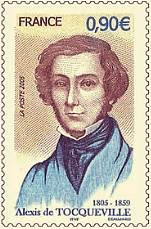 In 1831, Alexis de Tocqueville spent 10 months in America. Though only 25 at the time, the Frenchman would go on to write the foundational text on democracy upon which almost every successive discussion of the topic would be founded.
In 1831, Alexis de Tocqueville spent 10 months in America. Though only 25 at the time, the Frenchman would go on to write the foundational text on democracy upon which almost every successive discussion of the topic would be founded.I recently had the opportunity to listen to a lecture series on his work recorded about five years ago by a professor from SUNY Geneseo (part of the Great Courses series - I love our library!). The lectures were phenomenal; I found a many insights well worth chewing on and several that I am astonished not to have heard more about in recent years given national and international developments.
Rather than have a huge long post about them, I'm going to do a series of shorter posts by topic. Here are a few of the ideas that stood out for me:
1. Gun Control - every discussion ever had about gun control was unnecessary. The Founding Fathers made it explicitly clear in their writing and by their actions that the fundamental reason behind arming a populace (preferably to the teeth) is so that they can resist and restrict an overbearing government.
2. Social organizations (be it the local garden club or the NRA) serve an essential function in training up democratic citizens and grooming potential leaders for their future posts. Participation in this type of group should be held as a standard of behavior rather than an optional extracurricular.
3. Jury Duty was designed to be a training ground for informed, empowered citizens. Modern developments and attitudes have stripped us of this powerful tool.
4. The Federal government was never supposed to have any say in education. At all. The primary focus of education was literacy, because a literate populace can educate themselves on whatever subjects they need to master; they are also equipped to exercise and benefit from the essential Freedom of the Press.
5. Freedom is a double-edged sword; to fully embrace it, we will need to accept that some people will fail or make bad choices. It is their right to do so, and "nanny-state" attempts to change that are incompatible with democracy and freedom.
6. "Habits of the Heart" are an essential piece of a successful democracy. Without the correct foundation, the Republic will crumble. Puritan Christianity, Tocqueville believed, is an essential component of maintaining the national heart habits needed for the nation to thrive.
7. Democracy in America was created from the ground up, not the top down. This has serious implications for both how We The People handle our current government and political challenges and in our efforts to encourage democracy in other nations across the world.
8. Given the two above statements, Tocqueville did not find Islam to be compatible with democracy. Given our recent and current foreign policies, that thought alone may be enough to make most Americans ill.
I look forward to sharing with you some of what learned and hope you'll consider checking your library for the lecture series as well. With the current politcal and economic turmoil, we could all use a solid grounding in the truths that not only founded our great nation, but are likely the only way to save it.
No comments:
Post a Comment